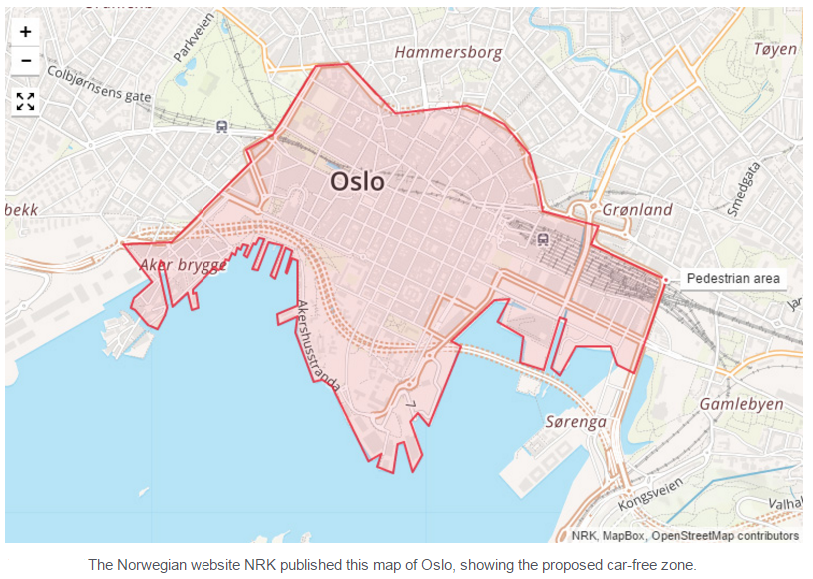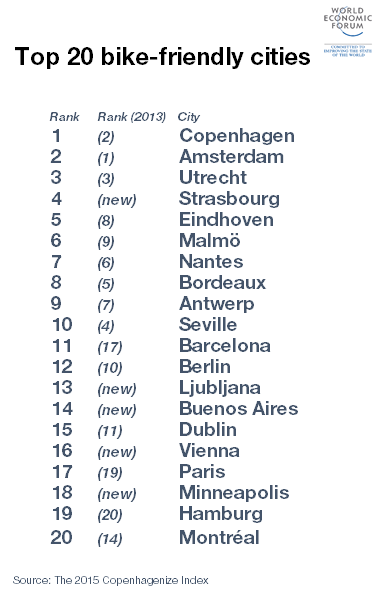Will we ever have car-free cities?


Get involved with our crowdsourced digital platform to deliver impact at scale
Stay up to date:
Cities and Urbanization
Can you imagine a city without the fumes, congestion and the roar of traffic? If Oslo achieves its vision, a car-free city might be more of a reality than you think.
In 2015, the Norwegian capital announced plans to ban all private vehicles from the city centre within the next four years. The move is part of a wider plan to halve emissions by 2020, and to make Oslo fossil-fuel free by around 2050. Norway already has the highest proportion of all-electric cars.
Source: NRK
Why are car-free cities important to our future?
Air pollution is a major cause of early death around the world, and major cities need to take action to curb vehicle emissions. With transport a major source of pollution, decreasing the number of cars in our cities could be an effective solution.
The environmental and health costs are all too apparent. Any plan to reduce vehicles will have a positive impact on the population, and the local environment.
Are other cities going car-free?
Oslo isn’t the only city to go car-free. 2015 saw Paris hold its first car-free day, with some 30% of the city covered by the ban. Pedestrians were free to roam along the Champs Elysées and street-fairs were held. Both air and noise pollution levels were also significantly reduced – for example nitrogen dioxide levels were 40% lower in some areas.
Hamburg also plans to ban cars on 40% of its road network. The ultimate aim is to provide links between parks and open spaces for pedestrians and bikes. It is hoped that both residents and the environment will feel the benefit – plus it brings the city one step closer to its 80% emission reduction target.
Then there’s Copenhagen. Large parts of the world’s most bike-friendly city have been closed to vehicles for years, and the Danish capital is building a series of cycle superhighways. A car-free day is also planned for next September. Deputy Mayor for the Environment, Morten Kabell, said, “In Paris, people suddenly realised how fantastic the boulevards are and how wonderful Paris’s urban space is, when it isn’t filled with cars. We can do the same in Copenhagen.”
It’s not just European cities jumping on the car-free bandwagon either, with Bogotá, Colombia leading the charge since 1974. Every week over 75 miles of the city’s roads are shut to vehicles and there are also over 200 miles of cycle lanes.
Hyderabad also closes part of its road network to cars every Thursday, while a Johannesburg suburb was closed to traffic for an entire month in October 2015.
So, car-free cities are certainly closer than they might appear at first glance. But, roads entirely clear of vehicles remain a long way off, with Oslo’s plan limited to private cars, and other cities restricted to constrained time periods.
To keep up with the Agenda subscribe to our weekly newsletter.
Author: Joe Myers is a Digital Content Producer at Formative Content.
Image: Drivers queue during evening rush hour on the M4 motorway, in west London, July 20, 2004. REUTERS/Toby Melville
Don't miss any update on this topic
Create a free account and access your personalized content collection with our latest publications and analyses.
License and Republishing
World Economic Forum articles may be republished in accordance with the Creative Commons Attribution-NonCommercial-NoDerivatives 4.0 International Public License, and in accordance with our Terms of Use.
The views expressed in this article are those of the author alone and not the World Economic Forum.
Related topics:
The Agenda Weekly
A weekly update of the most important issues driving the global agenda
You can unsubscribe at any time using the link in our emails. For more details, review our privacy policy.
More on Cities and UrbanizationSee all
Victoria Masterson
April 17, 2024
Victoria Masterson
April 12, 2024
Victoria Masterson
April 11, 2024
Sam Markey and Andrew Watkins
April 5, 2024
H. Kit Miyamoto, Olivia Nielsen, Ommid Saberi and Guido Licciardi
March 27, 2024
Victoria Masterson
March 26, 2024









